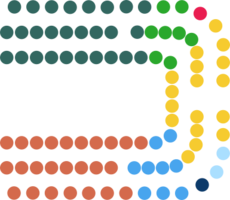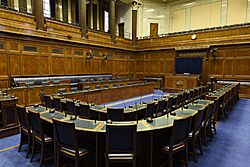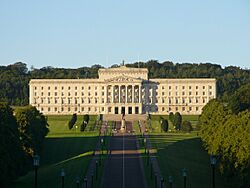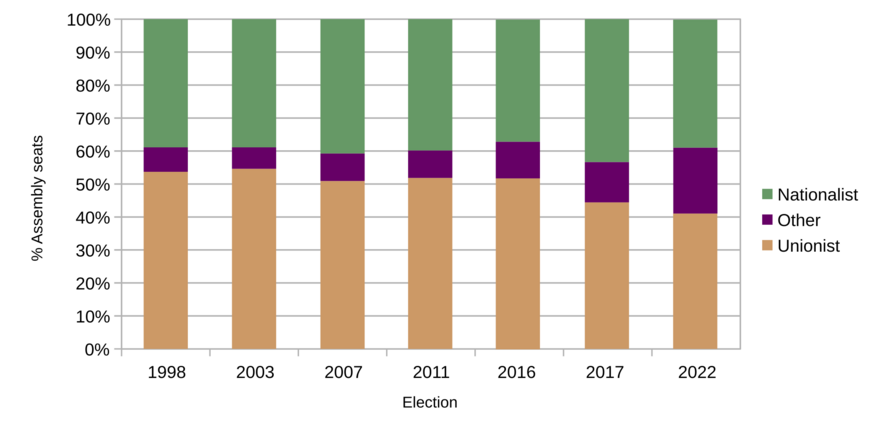Northern Ireland Assembly facts for kids
Quick facts for kids Northern Ireland AssemblyTionól Thuaisceart Éireann Norlin Airlan Assemblie |
|
|---|---|
| Seventh Assembly | |

Logo of the Northern Ireland Assembly
|
|
| Type | |
| Type | |
| History | |
| Founded | 25 June 1998 (current form) |
| Preceded by | Parliament of Northern Ireland (1921–1972) |
| Leadership | |
|
Edwin Poots
Since 3 February 2024 |
|
|
|
|
Matthew O'Toole, SDLP
Since 3 February 2024 |
|
| Structure | |
| Seats | 90 |
 |
|
|
Political groups
|
Executive (78)
Other Opposition (3) Speaker (1) |
| Committees |
Executive Office
Agriculture, Environment and Rural Affairs Communities Economy Education Finance Health Infrastructure Justice Assembly and Executive Review Audit Business Procedures Public Accounts Standards and Privileges |
|
Length of term
|
No more than 5 years |
| Salary | £55,000 per year + expenses |
| Elections | |
| Single transferable vote | |
|
Last election
|
5 May 2022 |
|
Next election
|
On or before 6 May 2027 |
| Redistricting | Recommendations made by the Boundary Commission for Northern Ireland; confirmed by the Secretary of State |
| Meeting place | |
 |
|
| Assembly Chamber, Parliament Buildings | |
 |
|
| Parliament Buildings, Stormont, Belfast, Northern Ireland |
|
The Northern Ireland Assembly is a special group of elected people who make laws for Northern Ireland. You might hear it called Stormont sometimes, because that's where its main building is in Belfast.
This Assembly is like a local parliament. It has the power to create laws for many things that affect people in Northern Ireland. It also chooses the leaders who run the government there. The Assembly has 90 members, called MLAs. These members are chosen by people voting in a special way called single transferable vote. This method helps make sure that different groups of people are represented.
The Assembly works by sharing power among the main political groups. This helps ensure that both unionists (who want Northern Ireland to stay part of the United Kingdom) and nationalists (who want Northern Ireland to be part of a united Ireland) work together to govern. This way, everyone has a say in how things are run.
The Assembly was created as part of the Good Friday Agreement in 1998. This agreement was a big step towards bringing peace to Northern Ireland after a long period of conflict and disagreement. The first elections for the Assembly happened in June 1998.
Contents
Understanding the Northern Ireland Assembly
A Look Back: How Northern Ireland Was Governed Before
Before the current Assembly, Northern Ireland had different ways of being governed. From June 1921 to March 1972, there was the Parliament of Northern Ireland. It met at Stormont. This parliament mostly had one main political party in charge.
In March 1972, the UK Government stopped this parliament. For a while, Northern Ireland was run directly by the UK Government. People then tried to create new ways of governing where different groups would share power. There were a couple of other Assemblies in 1973 and 1982, but they didn't last long because of ongoing disagreements.
The Assembly's Journey: From 1998 to Today
The current Northern Ireland Assembly officially started in 1998, following the Good Friday Agreement. This agreement was a plan for peace and power-sharing. The Assembly began its work fully in December 1999.
However, the Assembly's work has sometimes paused. There have been several times when it was suspended, meaning it stopped making laws for a while. These pauses happened because political parties couldn't agree on important issues.
- From February to May 2000, the Assembly was suspended.
- There were short suspensions in August and September 2001.
- A longer suspension happened from October 2002 to May 2007. During this time, parties disagreed about security matters. The UK Government had to postpone elections and make some decisions for Northern Ireland.
- Another long suspension occurred from January 2017 to January 2020. This was due to disagreements about a government program and other political issues. When the Assembly wasn't working, the UK Parliament in London had to make some laws for Northern Ireland.
- From February 2022 to February 2024, the Assembly was suspended again. This happened after the First Minister resigned, and parties couldn't agree on electing a new Speaker and forming a new government. During this time, the existing leaders continued in temporary roles.
Finally, on 3 February 2024, the Assembly started working again. New leaders were chosen, and a new government was formed, bringing back local decision-making to Northern Ireland.
How the Assembly Works: Powers and Responsibilities
The Assembly has two main jobs:
- It makes laws for Northern Ireland.
- It chooses the ministers (leaders) who run the government departments.
The main leaders, the First Minister and deputy First Minister, are chosen from the largest political parties. Other ministers are chosen based on how many seats each party has in the Assembly. This system helps ensure that different parties are involved in running the government.
What Laws Can the Assembly Make?
The Assembly can make laws on many "transferred matters." These are things that directly affect daily life in Northern Ireland. The UK Parliament in London keeps control over some "reserved matters" and "excepted matters." These are bigger issues that affect the whole United Kingdom.
Laws made by the Assembly must follow certain rules. For example, they must respect human rights.
Transferred Matters: Local Decisions
These are the areas where the Assembly makes laws and decisions:
- Agriculture, Environment and Rural Affairs (farming, nature, countryside)
- Communities (local services, housing, sports)
- Economy (jobs, businesses, money)
- Education (schools, colleges)
- Finance (government money, taxes)
- Health (hospitals, doctors, public health)
- Infrastructure (roads, public transport, water)
- Justice (local courts, policing)
- The work of the First and deputy First Ministers
These are areas where the UK Parliament usually makes laws, but they could be transferred to the Assembly in the future:
- Shipping and air travel
- The seabed and its natural resources
- Postal services
- Rules for importing and exporting goods
- Minimum wage
- Banking and financial services
- Intellectual property (like patents and copyrights)
- Units of measurement
- Telecommunications, broadcasting, and internet services
- The National Lottery
- Consumer safety
Excepted Matters: UK-Wide Decisions
These are areas that the UK Parliament always keeps control over:
- The Crown (the King or Queen)
- The UK Parliament itself
- Relationships with other countries
- Defence (the military)
- Immigration and citizenship
- National taxes
- National insurance
- Elections for the UK Parliament
- Currency (money)
- National security
- Nuclear energy
- Outer space and Antarctica activities
How Decisions Are Made in the Assembly
The Assembly uses special rules to make sure different groups work together. This is called "power-sharing."
- Sharing Ministerial Roles: When choosing ministers for government departments, a system called the D'Hondt method is used. This means that parties get ministerial jobs based on how many seats they have. This way, all major parties get a chance to be part of the government.
- Cross-Community Support: For some very important decisions, a special type of vote is needed. It's called a "cross-community vote." This means that a majority of members from both the unionist and nationalist groups must agree for the decision to pass. This helps protect the interests of both communities.
- Petitions of Concern: If 30 or more MLAs are worried about a decision, they can ask for a "petition of concern." This means that the vote on that decision will also need cross-community support. It's a way to make sure that one group can't pass a law that the other group strongly opposes.
These rules are designed to help different political groups work together and protect everyone's interests in Northern Ireland.
Who Are the Members of the Assembly?
The Assembly has 90 members, called MLAs. They are elected from different areas (constituencies) across Northern Ireland. Each MLA is elected for a term of up to five years. Elections happen every five years, unless the Assembly is dissolved early.
Different Groups in the Assembly
Each MLA chooses to be known as "Nationalist," "Unionist," or "Other."
- Unionists generally want Northern Ireland to remain part of the United Kingdom.
- Nationalists generally want Northern Ireland to be part of a united Ireland.
- Others are members who don't identify with either of these main groups.
This system helps ensure that the views of all these groups are considered in the Assembly's decisions.
Government and Opposition
The parties that form the government are called the Executive. Other parties can choose to be the Official Opposition. The Opposition's job is to question the government and suggest different ideas. This helps keep the government accountable.
Since 1998, many different parties have had members in the Assembly. The main parties have changed over time, with some growing stronger and others becoming smaller.
How the Assembly is Organized
The Assembly has a Speaker and three deputy speakers. The Speaker's job is to lead the meetings and make sure everyone follows the rules. The current Speaker is Edwin Poots.
There's also an Assembly Commission. This group manages the Assembly's money, pays the members, and looks after the needs of the political parties.
Committees: Getting Work Done
The Assembly has different committees. These are smaller groups of MLAs who look closely at specific topics.
- Statutory (Departmental) Committees: Each of these committees checks the work of a government department. For example, there's a Health Committee that looks at how the Health Department is doing.
- Standing Committees: These committees deal with the Assembly's own rules and how it operates.
- Assembly and Executive Review Committee
- Audit Committee
- Business Committee
- Procedures Committee
- Public Accounts Committee
- Standards and Privileges Committee
These committees help the Assembly do its work carefully and make good decisions for Northern Ireland.
See also
 In Spanish: Asamblea de Irlanda del Norte para niños
In Spanish: Asamblea de Irlanda del Norte para niños
- Member of the Legislative Assembly (Northern Ireland)
- List of political parties in Northern Ireland
- 2022 Northern Ireland Assembly election
- Members of the 7th Northern Ireland Assembly
- Scottish Parliament
- Senedd
- Oireachtas
 | Mary Eliza Mahoney |
 | Susie King Taylor |
 | Ida Gray |
 | Eliza Ann Grier |


